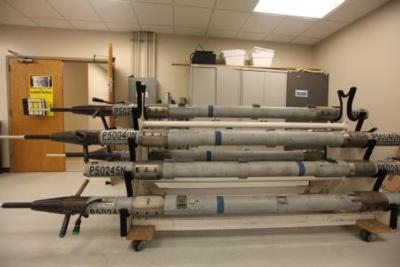Mon, Aug 06, 2012
Device Disguised As A Sidewinder Missile Indicates Aircraft Position, Flight Data
During training, Marine pilots participate in simulated aircraft versus aircraft dogfight operations in the skies above the Atlantic Ocean. Once the pilots are airborne, Marines and staff with the Tactical Training Range evaluate the pilots performance by using video and audio recording equipment as well as tactical combat training systems, disguised as sidewinder missiles.

“The (tactical combat training systems) are pretty much oversized global positioning systems designed to track and identify simulated adversary and friendly aircraft,” said Frenchy Levesqua, a TTR operations coordinator. “The concept used in the movie ‘Top Gun’ paints a clear picture of what we do here at the TTR. We allow pilots to review tactics, rules of engagement and communication brevity after the end of the mission.”
Pilot versus pilot training missions tasked to the TTR by squadrons can involve anywhere between two aircraft from Marine Aircraft Group 31 pitted against each other to aircraft from air stations in Oceania, VA, Cherry Point, NC, and Key West, FL. “The TTR has two primary functions for the pilot,” said Capt. Justin Gogel, a Marine All-Weather Fighter Attack Squadron 533 weapons systems officer. “The primary use is to graphically reconstruct what is happening in the air during training. There are a lot of dynamics to what is going on in the air during a mission and the TTR allows us to have a god’s-eye-view of everything and gives us something to reference to during debriefings,"
Practicing rules of engagement is one training principle during air-to-air scenarios where missions may require pilots to make visual contact with an unidentified aircraft. Gogel said that the second use of the TTR is to coordinate aircraft-to-aircraft intercept missions.
The air-to-air intercept controllers attend briefs with pilots and controllers during flight and after debriefings, said 1st Lt. Paul Nichol, a Marine Aviation Control Squadron 2 Emergency Warning and control detachment operations officer in charge. Overall, the Tactical Training Range brings together many elements of personnel and technology to create an advanced tool designed to give Marine pilots the advantage over any threat.
ANN Salutes Lance Cpl. Kris Daberkoe. (Image provided by the U.S.M.C)
More News
Also: Horizon Picks P&W PT6A, Army Buys 3 EagleNXT, First Hybrid-Electric Regional, Army Selects AEVEX Anduril Industries’ YFQ-44A Collaborative Combat Aircraft was flown>[...]
While Flying North Along The Beach At About 300 Ft Above Ground Level, The Pilot Reported That The Engine RPM Dropped To About Idle On September 28, 2025, at 1126 eastern daylight >[...]
Aero Linx: European Association of Aviation Training and Educational Organisations (EATEO) Welcome to the “ European Association of Aviation Training and Education Organizati>[...]
On-Course Indication An indication on an instrument, which provides the pilot a visual means of determining that the aircraft is located on the centerline of a given navigational t>[...]
“It also gives us the hard data we need to shape requirements, reduce risk, and ensure the CCA program delivers combat capability on a pace and scale that keeps us ahead of t>[...]
 Airborne-NextGen 11.04.25: Anduril YFQ-44A, Merlin SOI 2, UAV Rulemaking Stalled
Airborne-NextGen 11.04.25: Anduril YFQ-44A, Merlin SOI 2, UAV Rulemaking Stalled NTSB Prelim: Elmore Travis C Searey
NTSB Prelim: Elmore Travis C Searey ANN's Daily Aero-Linx (11.03.25)
ANN's Daily Aero-Linx (11.03.25) ANN's Daily Aero-Term (11.03.25): On-Course Indication
ANN's Daily Aero-Term (11.03.25): On-Course Indication Aero-News: Quote of the Day (11.03.25)
Aero-News: Quote of the Day (11.03.25)



